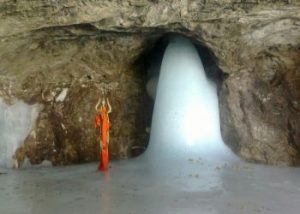Srinagar: Nearly two-month-long annual Amarnath Yatra ended peacefully today with the final prayer at the cave shrine in south Kashmir’s Anantnag district.
Around 300 pilgrims and seers attended the season’s final prayers inside the Himalayan cave shrine of Amarnath today.
The cave shrine is situated in Kashmir Himalayas at a height of around 13,000 feet above sea level.
Swami Dipendra Giri, custodian of Lord Shiva’s holy mace known popularly as the ‘Chhari Mubarak’, arrived with the mace at the cave today morning to herald the end of this year’s Yatra.
“The Puja has been completed with traditional devotion inside the holy cave shrine this morning,” Swami Dipendra Giri told.
“Around 300 devotees attended the Puja. We are now on our way back with the Chhari Mubarak,” he added.
Over 3.5 lakh pilgrims from different parts of the country performed this year’s Amarnath Yatra. Last year, nearly six lakh devouts had performed the pilgrimage.
Fear among the devotees in the aftermath of Uttarakhand tragedy is believed to be responsible for the lesser number of pilgrims for the Amarnath Yatra this year.
The passage of Yatris was strictly regulated by the authorities this year following directions of the Supreme Court. No unregistered pilgrim was allowed to undertake the Yatra this year.
Registered pilgrims were allowed to perform the Yatra only on the days scheduled in their registration.
The number of pilgrims proceeding to the cave shrine daily from Baltal and Nunwan base camps was also regulated. A maximum of 7,500 pilgrims was allowed each day from Baltal and Nunwan base camps towards the cave shrine.
Fourteen pilgrims died of natural causes during this year’s Yatra, which started June 28 and ended Aug 21 coinciding with Raksha Bandhan.
Traditionally state Governor N.N. Vohra, who is also the chairman of the Shri Amarnathji Shrine Board (SASB) that manages the affairs of the Yatra, would attend the Puja at the cave shrine on the last day of the pilgrimage.
Sources in the SASB said Vohra could not proceed to the cave shrine because of bad weather in the area.
The state government had made elaborate arrangements for the security and healthcare of the Yatris.
Besides the two base camps at Nunwan (Pahalgam) in the south and Baltal (Ganderbal) in the north, three transit camps were set up for this year’s pilgrimage.
A three-tier security ring manned by the army, the paramilitary and the state police provided security to the Yatris at the base camps and along the routes to the holy cave.
– IANS
The opinions, beliefs and viewpoints expressed by authors, news service providers on this page do not necessarily reflect the opinions, beliefs and viewpoints of Hill Post. Any views or opinions are not intended to malign any religion, ethnic group, club, organization, company, or individual.
Hill Post makes no representations as to the accuracy or completeness of any information on this site page.




